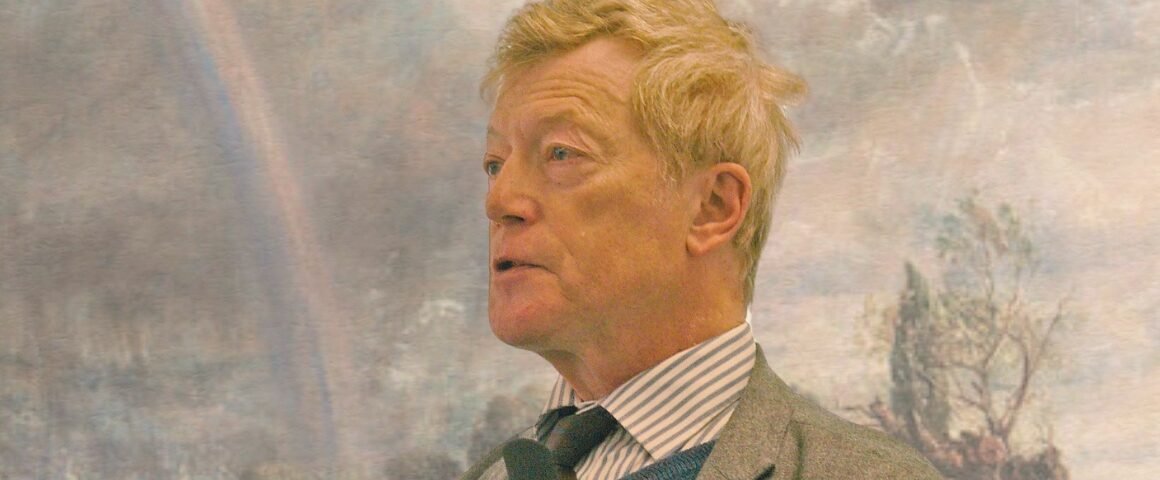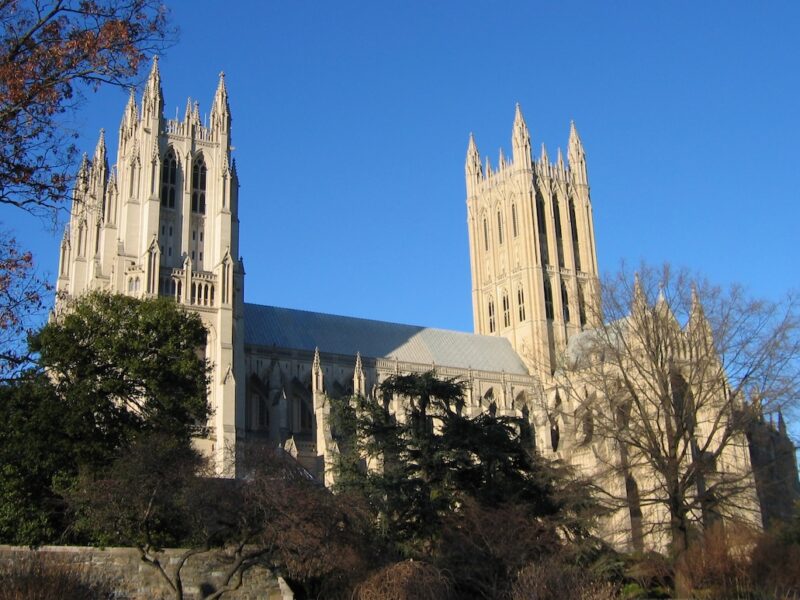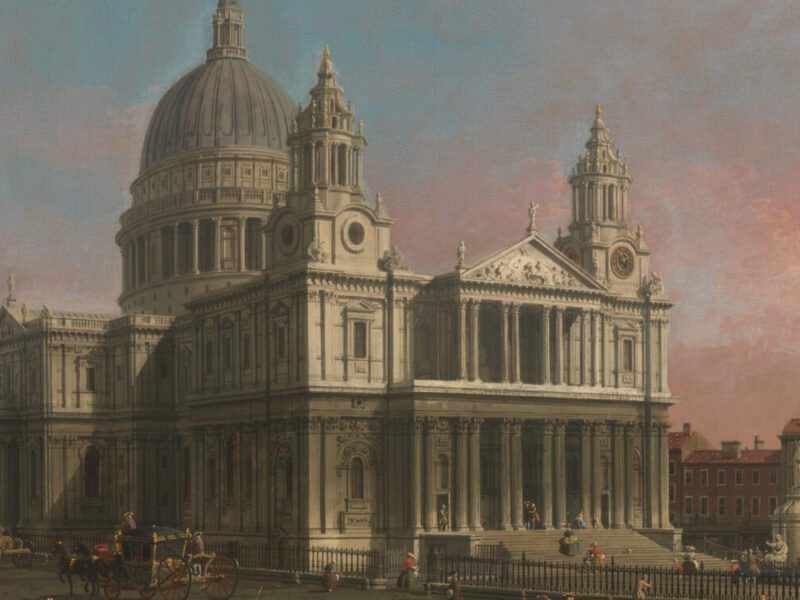The Anglican Church is a strange beast. Like any church she has a history she cannot shake, one that includes murky beginnings, fraught worldly loyalties, and spiritually dubious leadership. Yet, this history is one rooted equally in courageous witness, ingenious political compromise, and remarkable cultural and spiritual achievements. Among these is the space and nourishment she has offered to men of great individual genius. The late Sir Roger Scruton (1944-2020) is without doubt one of these.
There are very few souls in the contemporary world who possessed the intellectual acumen and spiritual imagination capable of succinctly cataloguing her history in the way that Sir Roger has done in his Our Church: A Personal History of the Church of England. To fully appreciate the significance of this short, yet spiritually powerful book, it is important to understand something about the greatness of its author. In what follows, I will say something about the man as I knew him. The essay that follows deals with the argument of the book itself.
Like other great Christian writers – think C.S. Lewis, Dante or St. Augustine, although he would prefer that you think of Chesterton and Eliot when you think of him – Sir Roger expressed universal truth in and through personal experience. He thought it essential that each of us see his life under the aspect of eternity, the point of view that allows a person to see that he is simultaneously the most and least important person in the world, that his life matters eternally and yet is totally insignificant in the face of the eternal.
Scruton is a deeply and perhaps surprisingly confessional writer. For someone with his conversative sensibilities, intellectual sophistication – nevermind his ‘Englishness’ – it is a strange thing that so much of his life is laid bare in his writings. In fact, you may read things there he has never told his closest friends. Indeed, not all of his friends, to say nothing of his enemies, approved of his confessional turn, but I think it is essential to his worldview and his tremendous reach across political, religious, and philosophical lines that he did so.
If it will not offend the reader, from here I will refer to him by his Christian name. There is an intimacy in what I would like to say that would ring hollow otherwise.
Roger passed away in January of this year in a London hospital of complications connected to cancer. This was a tremendous blow for family and friends, particularly because there was hope that he might recover and live a good while longer.
I first became aware of Roger’s work as an undergraduate. My tutor asked the tutorial, a group of about fifteen students, how many of us would be willing to die for our country. Mine was the only hand that went up. I had not sought to stand out – just the opposite. My instinct had been to blend in with my peers by giving what I assumed would be the default patriotic response.
The next day my tutor slapped a copy of a book on the table in front of me, a book called On Hunting by a fellow called Roger Scruton.
I was completely baffled. Why on earth should a boy from Nova Scotia have the slightest interest in a book about fox hunting in England? But I read the book cover to cover in a single sitting, my attention seized by the elegant prose and then held in place by the argument, one that was as much a defence of western culture writ large as it was an attempt to justify the ancient privileges of fox hunters in England. Nearly ten years later I met the man in Cambridge and later hosted a conference on his work at McGill, after which he became a philosophical mentor and friend.
While he had a devoted following that allowed him to make a living from writing lucid but philosophically challenging books, even those closest to him did not realize the extent of his influence on former students, world class intellectuals, statesmen, and of course a dedicated public readership until after he died. In this sense, his death has brought many from disparate walks of life into a spiritual communion that – mirabile dictu! – would not have been possible while he lived.
I have been personally grateful to come to know him better from the eulogies and testimonies of friends and colleagues published following his unexpected, if not quite sudden, death. His funeral was held in the Abbey of Malmesbury, England, sometime home of Thomas Hobbes, whom Roger admired. It is my belief that as the greatest living English intellectual he deserved to have his funeral at St. Paul’s or Westminster Abbey. I hope that eventually room will be made for him in the poet’s corner of the Abbey.
Yet somehow it was more fitting that his funeral took place closer to his adopted home at Sundey Hill Farm where he played the organ on Sundays in the church of All Saints, Gardson where he was buried. It was here – in a sleepy community on the periphery of the Cotswolds, after living a restless, albeit productive life, as a nomadic, existentially driven philosopher – that Roger was finally able to live the philosophy he espoused; here he discovered the highest peace this world can offer in the form of family life in a settled community. The philosopher of oikophilia (love of home) had at long last found a home of his own.
Roger was deeply proud of his adopted community and quickly became expert in the local history. The most important part of his social life was the weekly hunt. To give a sense of his commitment to that pastime, it is enough to know that while teaching at Boston University he would fly home on weekends to follow the cry of the hounds that chased the fox, and that he moved to Virginia when the British Parliament outlawed the practice as inhumane, before eventually returning to England to raise his family. Roger married local Wiltshire historian Sophie Jeffreys who had a deep affection for Malmesbury and the surrounding environs. Roger would not have fallen in love with the land as he did had it not been for Sophie.
During a family visit to Sundey Hill Farm on our way to Sunday morning service in Gardson, Lady Scruton insisted that we pull over onto a friend’s property to enjoy a spectacular view of Malmesbury Abbey. Her attachment to the beauty of the land, to architecture that grew out of it, and to the people that cared for it was palpable. The way Roger and Sophie met was an accident, but there was nothing accidental about why they found one another.
Before settling down to build Scrutopia (his ironic pet name for Sundey Hill Farm) Roger had been hunting his entire life. This is what philosophers do, something a German Cardinal once called the Venatio Sapientiae – the hunt for wisdom. When he settled near Malmesbury it was the fox hunt that finally gave him the home he had been seeking his entire life. Sophie rescued him one day on the hunt after he fell off his horse. Local tell is that Roger had admired her from afar before that fateful day, but it was the fall that initiated their courtship.
Roger was moved by Sophie’s willingness to give up her day to help him. For those who are not hunting aficionados, the hounds do not wait for you to lick your wounds! He described their courtship to me once as ‘quiet.’ A simple but fitting description from this wordsmith who had a way of letting things speak for themselves. Sophie quietly gave up her day and then her life to him. What they achieved together was, I’m sure, beyond anything either could have imagined or hoped for. They have two kind and engaging children, Sam and Lucy, who read theology and biology at Oxford respectively. Their story is proof that love begets love, and that it chooses you before you choose it.
Histories of great men have fallen out of fashion but they remain one of the most effective tools for stimulating the work of memory that history requires. The most popular history books of the last century had a Churchill or an Anne Frank as their subject. I was not surprised to discover that in Roger’s last days he was, among other things, reading Homer. His poems were about great men deeply concerned about how they would be remembered: their putative greatness hinged on their willingness to confront the world and leave their mark, on the condition that they accepted their mortality. Plato learned from this trick of the poets: Socrates became his mouthpiece and may be a name better known to history than that of the man whose dialogues made the gadfly of Athens famous. These men were born great, achieved greatness, and had it thrust upon them by recognizing that they were in but not of the world.
The church itself can be read and known as a history of great men. The Christian religion – its sacred texts, rituals, liturgical calendar, and creeds – were invented by those collectively referred to as ‘fathers.’ Think of the histories of popes and bishops, the histories of the saints, of the patriarchs, prophets and apostles. All of these are iterations of the history of Christ, the lamb who was slain before the foundation of the world: one who entered history but stands outside of it as its source and end. These are the images, the icons of our culture. The greatness of Christ goes before us all.
The greatness of individuals is inspiring because first it is humbling. We all need father figures – we call God ‘Our Father’ – because we long to be noticed by someone greater than ourselves. We require proof that we are worth saving, proof of our own potency that others so evidently possess and next to which we ourselves pale in comparison.
This is why greatness endures in our culture. The existentialism that dominates the crass forms of modern individualism is itself a kind of proof of this need. Hell is others, they say. This is a parody of the true church: a monasticism without community embracing the nausea of isolation. We cannot endure except in communion with greatness. Everybody knows this in their own heart, and none knew this better than Roger.
Roger was as modest as it was possible for a man with a mind like his to be. He felt it was his bounden duty to share the remarkable cultural inheritance Christian civilization made possible.
I will leave you here with a vivid personal image of my own, yet it was not one I experienced first hand. It looms large in my imagination nevertheless, for it illustrates the power of Roger’s greatness, the power to foster spiritual community.
My wife went to Malmesbury the day before Roger’s funeral to rehearse some music she was to sing for the service, a ‘performance,’ she told me, that was the most difficult she ever had to give. Roger was a father figure to her. She had sung his music in the past and he encouraged her in a way perhaps no one else ever had, because no one better understood and articulated the vocation and consolation of the musical life than did Roger.
Walking around the medieval centre on the morning of the funeral, she was moved by the scene of so many young men puttering around the Abbey Close and shops, all carrying one of Roger’s books under their arm. Though smartly dressed and likely highly talented young men, she was struck by how boyish they seemed, in the best possible sense. You could feel their devotion to a man they admired in the way they clutched at their books, in the way they so obviously had once hung on his every word. You could feel that they would continue to do so as they matured. Even now they prepared for this future, revisiting a favourite passage in the very homeland of the great man, now awaiting burial a stone’s throw away in the ancient abbey towering over them. Like the man himself, an awesome yet comforting presence.
Part of the reason this scene was so moving, my wife explained, was that it reminded her of me: of the way I would slip into my study or disappear into the local park after purchasing Roger’s latest and in an instant become carried away by his elegant prose and by the sparkling energy of his mind that leapt off the page and into my own.
The only thing quite like this kind of focus is the child at play, committed to the pointless but unquestionable seriousness of the game. This power, one Roger himself may not have entirely appreciated that he had, was perhaps the greatest achievement of a great man. In fact, this was more than an achievement. This was a gift, the gift that all great teachers are. Roger made a gift of himself in his life and writings. It was his sincere hope, quietly but powerfully expressed, that others would follow his example and discover their own way of making a gift of their own lives to the true, good and beautiful. In a word, Roger saw the world in sacramental terms. This is perhaps the most important thing to know about this great man.





'Roger Scruton: A Brief Personal History of a Great Man' have 3 comments
May 20, 2020 @ 4:07 am Alan Robinson
This is a really beautiful piece of writing which I have just discovered and enjoyed.Thank you for making it available.
May 21, 2020 @ 1:23 pm Chris Ogunlowo
Thanks for writing such a befitting and beauty piece. The cadence suits the subject. Roger was a man with a rare intellect and grace, one who comforts and enlightens his readers in the same manner as his devotion to the subjects that occupy his enormously meaningful life.
October 26, 2024 @ 2:14 pm Christopher G Johnson
Outrageous I could not place my comment